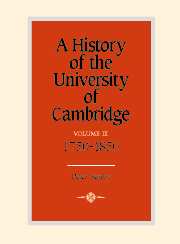Book contents
- Frontmatter
- Contents
- List of illustrations
- General Editor's preface
- Acknowledgements
- List of abbreviations
- Introduction
- 1 Townscape and university: topographical change
- 2 The university: its constitution, personnel, and tasks
- 3 Colleges: buildings, masters, and fellows
- 4 Colleges: tutors, bursars, and money
- 5 Mathematics, law, and medicine
- 6 Science and other studies
- 7 Religion in the university: its rituals and significance
- 8 The Orthodox and Latitudinarian traditions, 1700–1800
- 9 Cambridge religion 1780–1840: Evangelicalism
- 10 Cambridge religion: the mid-Victorian years
- 11 The university as a political institution, 1750–1815
- 12 The background to university reform, 1830–1850
- 13 Cambridge and reform, 1815–1870
- 14 The Graham Commission and its aftermath
- 15 The undergraduate experience, I: Philip Yorke and the Wordsworths
- 16 The undergraduate experience, II: Charles Astor Bristed and William Everett
- 17 The undergraduate experience, III: William Thomson
- 18 Games for gownsmen: walking, athletics, boating, and ball games
- 19 Leisure for town and gown: music, debating, and drama
- Appendices
- Bibliography
- Index
14 - The Graham Commission and its aftermath
Published online by Cambridge University Press: 05 April 2012
- Frontmatter
- Contents
- List of illustrations
- General Editor's preface
- Acknowledgements
- List of abbreviations
- Introduction
- 1 Townscape and university: topographical change
- 2 The university: its constitution, personnel, and tasks
- 3 Colleges: buildings, masters, and fellows
- 4 Colleges: tutors, bursars, and money
- 5 Mathematics, law, and medicine
- 6 Science and other studies
- 7 Religion in the university: its rituals and significance
- 8 The Orthodox and Latitudinarian traditions, 1700–1800
- 9 Cambridge religion 1780–1840: Evangelicalism
- 10 Cambridge religion: the mid-Victorian years
- 11 The university as a political institution, 1750–1815
- 12 The background to university reform, 1830–1850
- 13 Cambridge and reform, 1815–1870
- 14 The Graham Commission and its aftermath
- 15 The undergraduate experience, I: Philip Yorke and the Wordsworths
- 16 The undergraduate experience, II: Charles Astor Bristed and William Everett
- 17 The undergraduate experience, III: William Thomson
- 18 Games for gownsmen: walking, athletics, boating, and ball games
- 19 Leisure for town and gown: music, debating, and drama
- Appendices
- Bibliography
- Index
Summary
Whereas, we have deemed it expedient for divers good causes and considerations that a Commission should forthwith issue for this proposal of enquiring into the State, Discipline, Studies, and Revenues of Our University of Cambridge and of all and singular the Colleges in Our said University.
Royal Commission dated 31 August 1850THE GRAHAM COMMISSION, 1850
LORD JOHN RUSSELL AND THE PRINCE CONSORT
The appointment of Lord John Russell as Prime Minister in 1846 and the election of Prince Albert, Queen Victoria's Consort, as Chancellor of the University of Cambridge, brought university reform nearer and affected the way it was accomplished. Russell's restless temperament and reforming tendencies made him responsive to the clamour for change at the universities, and dissatisfied with the leisurely pace that they thought it fitting to employ. The Chancellor was also keen to effect change and used his position as Chancellor to press for it, but he was more anxious than Russell to work with the university if possible; he restrained Russell from pressing ahead with a royal commission at least once, but in the end failed to influence the Prime Minister, who was after all far more powerful than the Queen's Consort, however intelligent and perceptive Albert might be.
Russell was unusual among British (or at least English) politicians in not having spent any time at either university. His elder brother, the Marquess of Tavistock, had received only a ‘pretended education’ at Cambridge, and their father, the Duke of Bedford, declaring that ‘nothing was learned in the English universities’, sent John Russell to Edinburgh.
- Type
- Chapter
- Information
- A History of the University of Cambridge , pp. 507 - 544Publisher: Cambridge University PressPrint publication year: 1997



